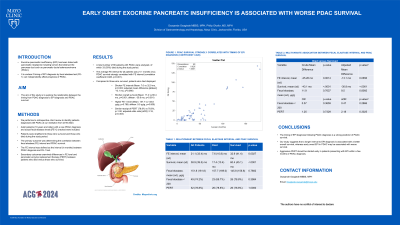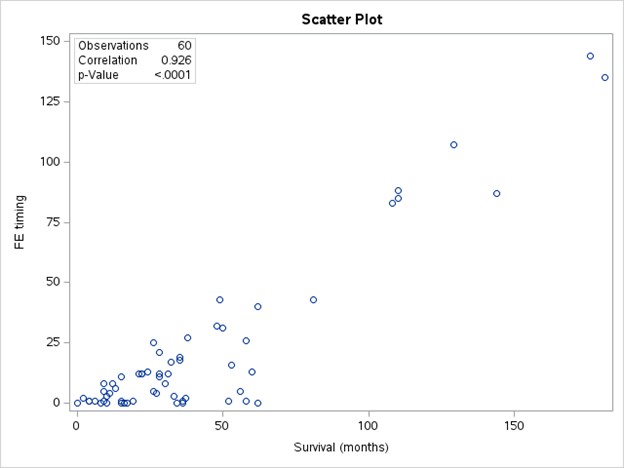Sunday Poster Session
Category: Biliary/Pancreas
P0055 - Early Onset Exocrine Pancreatic Insufficiency is Associated With Worse PDAC Survival
Sunday, October 27, 2024
3:30 PM - 7:00 PM ET
Location: Exhibit Hall E

Has Audio

Osayande Osagiede, MBBS, MPH
Mayo Clinic
Jacksonville, FL
Presenting Author(s)
Osayande Osagiede, MBBS, MPH, Phillip Okafor, MD, MPH
Mayo Clinic, Jacksonville, FL
Introduction: Exocrine pancreatic insufficiency (EPI) has been linked with pancreatic neoplasms including tumors that obstruct the pancreas duct such as pancreatic ductal adenocarcinoma (PDAC). It is unclear if timing of EPI diagnosis by fecal elastase test (FE-1) can independently affect prognosis of PDAC. The aim of this study is to explore the relationship between the timing from PDAC diagnosis to EPI diagnosis and PDAC survival.
Methods: We performed a retrospective chart review to identify patients diagnosed with PDAC at our institution from 2016-2023. Adult patients (18 years and older) with a new PDAC diagnosis and actual fecal elastase levels [FE-1] checked were included. Patients were stratified into those who survived and those who died during the study period. The primary outcome was determining the correlation between fecal elastase (FE) interval and PDAC survival. The FE interval was defined as the interval (in months) between PDAC diagnosis and FE-1 test. Secondary outcomes examined differences FE level and pancreatic enzyme replacement therapy (PERT) between patients who died versus those who survived.
Results: A total number of 66 patients with PDAC were analyzed, of which 33 (50%) died during the study period. The average FE interval for all patients was 21.1 months (mo). PDAC survival strongly correlated with FE interval (correlation coefficient 0.926, p< 0.001). Patients who died displayed a shorter FE interval (Mean: 7.6 vs 32.9 mo, p=0.003; adjusted mean difference [aMean]: -13.1 mo, p=0.066), shorter overall survival (Mean: 17.4 vs 60.4 mo, p< 0.001; aMean: -30.8 mo, p< 0.001), higher FE-1 level (Mean: 157.7 vs 145.8 μg/g, p=0.768; aMean: 9.5 μg/g, p=0.809) and a similar receipt of PERT (78.8% vs 78.8%, p=1.00; adjusted odds ratio [aOR]: 2.18, p=0.303), compared to those who survived.
Discussion: The timing of EPI diagnosis following PDAC diagnosis is a strong predictor of PDAC survival. Our study suggests that a longer interval to EPI diagnosis is associated with a better overall survival, whereas early onset EPI in PDAC may be associated with worse survival. Aggressive PERT should be started early in patients presenting with EPI within a few months of PDAC diagnosis.

Note: The table for this abstract can be viewed in the ePoster Gallery section of the ACG 2024 ePoster Site or in The American Journal of Gastroenterology's abstract supplement issue, both of which will be available starting October 27, 2024.
Disclosures:
Osayande Osagiede, MBBS, MPH, Phillip Okafor, MD, MPH. P0055 - Early Onset Exocrine Pancreatic Insufficiency is Associated With Worse PDAC Survival, ACG 2024 Annual Scientific Meeting Abstracts. Philadelphia, PA: American College of Gastroenterology.
Mayo Clinic, Jacksonville, FL
Introduction: Exocrine pancreatic insufficiency (EPI) has been linked with pancreatic neoplasms including tumors that obstruct the pancreas duct such as pancreatic ductal adenocarcinoma (PDAC). It is unclear if timing of EPI diagnosis by fecal elastase test (FE-1) can independently affect prognosis of PDAC. The aim of this study is to explore the relationship between the timing from PDAC diagnosis to EPI diagnosis and PDAC survival.
Methods: We performed a retrospective chart review to identify patients diagnosed with PDAC at our institution from 2016-2023. Adult patients (18 years and older) with a new PDAC diagnosis and actual fecal elastase levels [FE-1] checked were included. Patients were stratified into those who survived and those who died during the study period. The primary outcome was determining the correlation between fecal elastase (FE) interval and PDAC survival. The FE interval was defined as the interval (in months) between PDAC diagnosis and FE-1 test. Secondary outcomes examined differences FE level and pancreatic enzyme replacement therapy (PERT) between patients who died versus those who survived.
Results: A total number of 66 patients with PDAC were analyzed, of which 33 (50%) died during the study period. The average FE interval for all patients was 21.1 months (mo). PDAC survival strongly correlated with FE interval (correlation coefficient 0.926, p< 0.001). Patients who died displayed a shorter FE interval (Mean: 7.6 vs 32.9 mo, p=0.003; adjusted mean difference [aMean]: -13.1 mo, p=0.066), shorter overall survival (Mean: 17.4 vs 60.4 mo, p< 0.001; aMean: -30.8 mo, p< 0.001), higher FE-1 level (Mean: 157.7 vs 145.8 μg/g, p=0.768; aMean: 9.5 μg/g, p=0.809) and a similar receipt of PERT (78.8% vs 78.8%, p=1.00; adjusted odds ratio [aOR]: 2.18, p=0.303), compared to those who survived.
Discussion: The timing of EPI diagnosis following PDAC diagnosis is a strong predictor of PDAC survival. Our study suggests that a longer interval to EPI diagnosis is associated with a better overall survival, whereas early onset EPI in PDAC may be associated with worse survival. Aggressive PERT should be started early in patients presenting with EPI within a few months of PDAC diagnosis.

Figure: Figure 1: Timing of EPI Diagnosis and PDAC survival. PDAC survival strongly correlates with timing of EPI diagnosis.
Note: The table for this abstract can be viewed in the ePoster Gallery section of the ACG 2024 ePoster Site or in The American Journal of Gastroenterology's abstract supplement issue, both of which will be available starting October 27, 2024.
Disclosures:
Osayande Osagiede indicated no relevant financial relationships.
Phillip Okafor indicated no relevant financial relationships.
Osayande Osagiede, MBBS, MPH, Phillip Okafor, MD, MPH. P0055 - Early Onset Exocrine Pancreatic Insufficiency is Associated With Worse PDAC Survival, ACG 2024 Annual Scientific Meeting Abstracts. Philadelphia, PA: American College of Gastroenterology.
